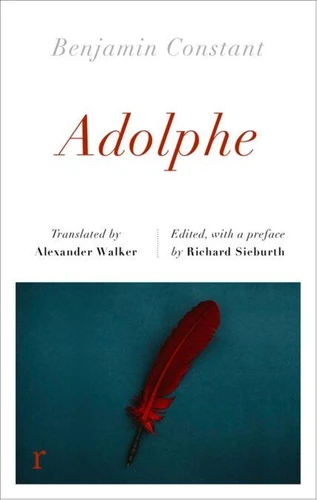Adolphe (riverrun editions)
Par :Formats :
Disponible dans votre compte client Decitre ou Furet du Nord dès validation de votre commande. Le format ePub protégé est :
- Compatible avec une lecture sur My Vivlio (smartphone, tablette, ordinateur)
- Compatible avec une lecture sur liseuses Vivlio
- Pour les liseuses autres que Vivlio, vous devez utiliser le logiciel Adobe Digital Edition. Non compatible avec la lecture sur les liseuses Kindle, Remarkable et Sony
- Non compatible avec un achat hors France métropolitaine
 , qui est-ce ?
, qui est-ce ?Notre partenaire de plateforme de lecture numérique où vous retrouverez l'ensemble de vos ebooks gratuitement
Pour en savoir plus sur nos ebooks, consultez notre aide en ligne ici
- Nombre de pages160
- FormatePub
- ISBN978-1-5294-0555-2
- EAN9781529405552
- Date de parution06/01/2021
- Protection num.Adobe DRM
- Infos supplémentairesepub
- ÉditeurRiverrun
Résumé
'One of the undisputed masterpieces of early nineteenth-century French prose fiction.'From Richard Sieburth's preface to AdolphePublished simultaneously in London and Paris in 1816, Adolphe is the story of a tragic love affair between its narrator and his lover Ellenore, two characters locked into a fatal dance of self-destruction. In what is one of the earliest examples of autofiction, from a period when all creative endeavour was permeated by autobiography.
Constant's aim was to create an exemplary fiction of high moral purpose which would also function as an act of intimate self-vindication and revenge on his former lover, the formidable Madame de Stael. The result is a tautly-strung Racinian tragedy in prose. Soon after publication, Constant was defending himself from charges that he had written a novel based on real people, which he strenuously denied.
The work was translated into English by Alexander Walker, and overseen by the author, resulting in what Richard Sieburth describes as 'an eccentrically bevelled jewel of Regency prose'. This riverrun edition publishes Walker's translation and Constant's preface in a new edition here for the first time since 1817.
Constant's aim was to create an exemplary fiction of high moral purpose which would also function as an act of intimate self-vindication and revenge on his former lover, the formidable Madame de Stael. The result is a tautly-strung Racinian tragedy in prose. Soon after publication, Constant was defending himself from charges that he had written a novel based on real people, which he strenuously denied.
The work was translated into English by Alexander Walker, and overseen by the author, resulting in what Richard Sieburth describes as 'an eccentrically bevelled jewel of Regency prose'. This riverrun edition publishes Walker's translation and Constant's preface in a new edition here for the first time since 1817.
'One of the undisputed masterpieces of early nineteenth-century French prose fiction.'From Richard Sieburth's preface to AdolphePublished simultaneously in London and Paris in 1816, Adolphe is the story of a tragic love affair between its narrator and his lover Ellenore, two characters locked into a fatal dance of self-destruction. In what is one of the earliest examples of autofiction, from a period when all creative endeavour was permeated by autobiography.
Constant's aim was to create an exemplary fiction of high moral purpose which would also function as an act of intimate self-vindication and revenge on his former lover, the formidable Madame de Stael. The result is a tautly-strung Racinian tragedy in prose. Soon after publication, Constant was defending himself from charges that he had written a novel based on real people, which he strenuously denied.
The work was translated into English by Alexander Walker, and overseen by the author, resulting in what Richard Sieburth describes as 'an eccentrically bevelled jewel of Regency prose'. This riverrun edition publishes Walker's translation and Constant's preface in a new edition here for the first time since 1817.
Constant's aim was to create an exemplary fiction of high moral purpose which would also function as an act of intimate self-vindication and revenge on his former lover, the formidable Madame de Stael. The result is a tautly-strung Racinian tragedy in prose. Soon after publication, Constant was defending himself from charges that he had written a novel based on real people, which he strenuously denied.
The work was translated into English by Alexander Walker, and overseen by the author, resulting in what Richard Sieburth describes as 'an eccentrically bevelled jewel of Regency prose'. This riverrun edition publishes Walker's translation and Constant's preface in a new edition here for the first time since 1817.





















